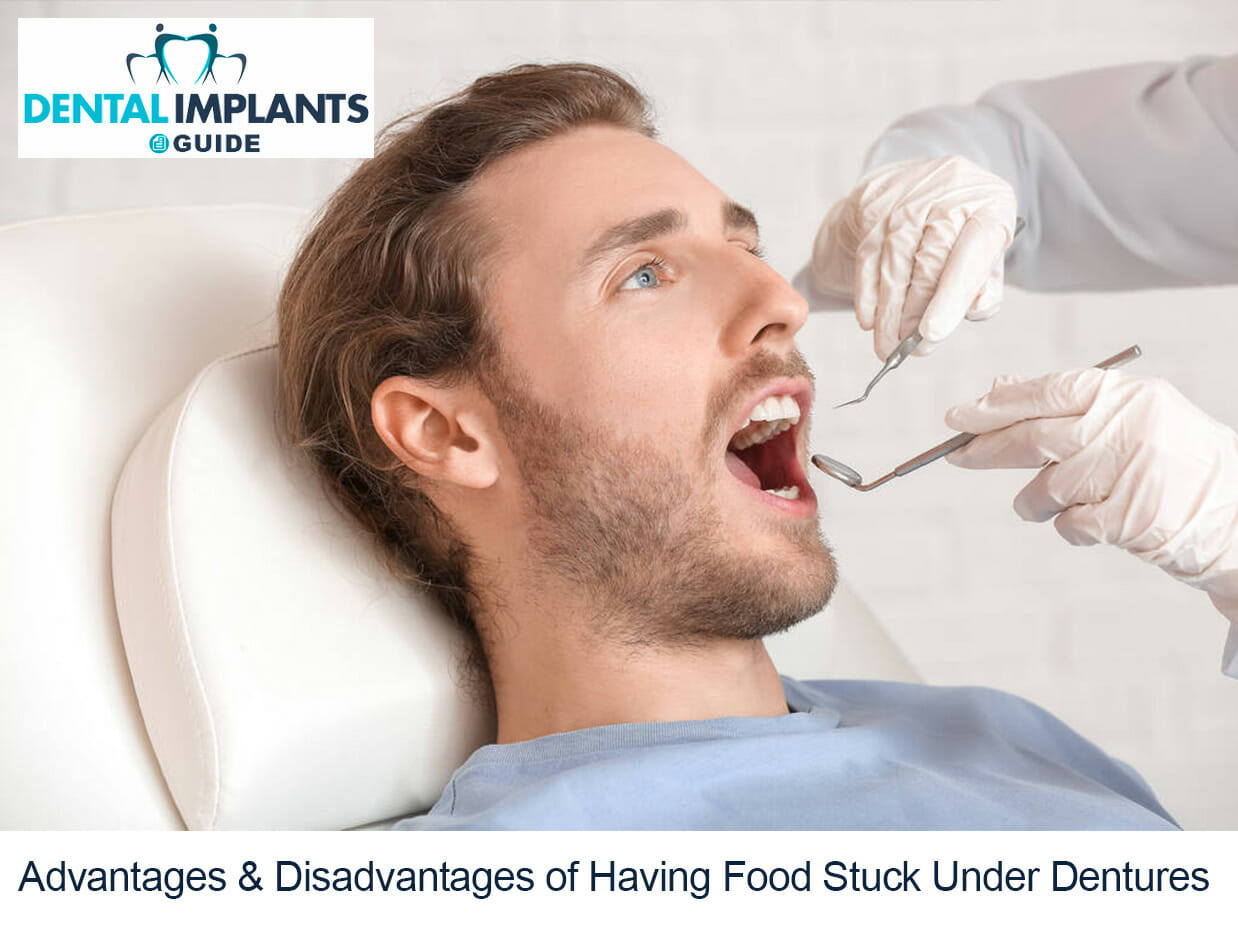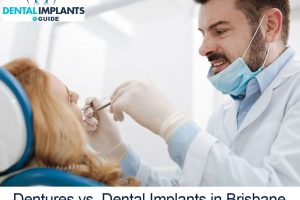Advantages & Disadvantages of Having Food Stuck Under Dentures
Advantages & Disadvantages of Having Food Stuck Under Dentures
High Quality Dental Implants Affordable Prices FREE Consultation

Advantages & Disadvantages of Dentures
Missing teeth cause problems with both your appearance and overall oral health. Without our teeth, we struggle to chew and digest our food and speak.
Furthermore, decaying and missing teeth increases the risk of gum disease. If having missing teeth, you might want to consider getting dentures in Perth, Australia.
This blog will look at the benefits and drawbacks of dentures and obtain them in greater detail. Additionally, prevent food from becoming stuck between your dentures by taking the necessary precautions. For a quick and lifetime fix check out dental implants to learn more.

What are Dentures?
A dental denture is a removable dental appliance used to replace missing teeth and oral tissues. Complete dental dentures and partial dentures are the two types of dentures available.
- Complete dentures are used when all of the teeth are missing
- Partial dental dentures are used when some natural teeth are still present.
In addition, it should be noted that there is no such thing as a “permanent denture,” as the shape of your mouth will continue to change over time. Well-made dentures can last you for 5 to 10 years, but they may need to be adjusted or re-made depending on how quickly your mouth heals.
Advantages of Dentures
Perhaps the most significant advantage of immediate dentures is that you never have to worry about appearing in public without teeth. Other advantages are as follows:
- When some teeth remain in your mouth, your natural teeth’ shape, size, and arrangement can be more closely replicated.
- Immediate dentures act as a bandage and aid in the reduction of bleeding.
- Immediate dentures protect the tissues at the sensitive extraction sites from irritation from the tongue and food. This may cause you more minor discomfort than traditional denture construction.
- Immediate dentures can make it easier for you to establish your speech patterns. Before getting dentures, you won’t have to relearn how to speak without teeth.
- During the typical waiting period for conventional dentures, you can chew better with immediate dentures than you could without teeth.
- Dentures that do not replace natural teeth quickly cause the cheeks to collapse.
- If you go without teeth for an extended period, you may develop oral habits that make it challenging to learn how to use dentures properly.
Disadvantages of Dentures
The insertion of immediate dentures, like any other procedure, has limitations that you should be aware of. Immediate dentures are not recommended for some people due to their general health or specific oral problems.
- During the first few months, more office visits are required to watch for gums and mouth function changes. Also, the denture’s original good fit and occlusion will be lost as healing occurs. This is normal.
- Immediate dental dentures usually need to be re-fitted by a dentist after a few months (usually six) due to tissue changes after teeth are removed. This entails additional costs. New dentures may be required in some cases.
- Immediate dentures will not always fit as well as conventional dentures made after the gums have healed in areas where the last remaining teeth will be extracted.
- Because some of your natural teeth are still present, you won’t be able to see how the dentures will fit in your mouth until the natural teeth are removed.
- Because of the additional time required for denture construction, immediate dentures are usually more expensive.
- A “permanent denture” is a myth because the shape of your mouth will change over time. Well-made dentures can last 5 to 10 years, but depending on the healing process, they may need to be re-made or adjusted.
(Discuss your dental situation with us)
Why is Food Sticking to My Dentures?
When you eat, some food will naturally fall to the floor of your mouth, and this can result in food particles becoming trapped under your bottom dentures. Taking new bites of food before you have completely cleared your mouth of the last bite may increase the likelihood of food becoming stuck to your dentures.

Developments In The Stability And Longevity Of Dentistry
1. Oral Hygiene
Patients should take proper care of their gums and teeth once their dentures are fixed and ready to use. Brushing the dentures, tongue, and gums twice a day is recommended. Patients must also floss every day to remove any debris stuck between their teeth. Decay does not affect false teeth, but plaque build-up can cause gum disease and bad breath. Denture wearers must also visit the dentist every six months to have their dentures checked and look for early signs of any dental problems.
2. Using Implant-Supported Dentures
Traditional dentures have several advantages that implant-supported dentures do not. Implant-supported dentures allow patients to eat, speak, and smile with confidence. In addition, implant-supported dentures aid in improving a patient’s oral health.
Frequently Asked Questions About Dentures
When you first get your new dental dentures, eating may be difficult. Your dentures may slip out of place when you bite down or chew. Nuts and seeds, for example, can become stuck under your dentures and cause discomfort. When your dentures are new, stick to easy-to-eat foods to avoid these issues.
There are solutions available to help make them as short-lived as possible – from temporarily adjusting your diet to using an effective denture adhesive like the new Poligrip Max Seal that creates a superior sealant and helps to block out irritating food particles.
When you first get dentures, you should be cautious about what you eat. When wearing dentures, it is best to avoid the following foods:
- Gum,
- Nuts
- Popcorn
- Sticky candy
- Apples
- Carrots,
- other hard fruits and veggies, and
- chewy, tough meat.
It’s a mixture of different chemical compounds. If the adhesive oozes out of the denture or remains on your gums after several hours of use, you’re using too much. Swallowing too much denture adhesive can make you sick to your stomach.
Snap-in dentures improve chewing ability. There is less friction on the gums due to wearing a snap-in denture. Many people consider snap-in dentures to be more natural-looking than conventional dentures. The jawbone is preserved, and further bone loss is prevented with snap-in dentures.
Dental dentures that don’t fit properly can irritate the gums, resulting in inflammation, raw spots, and bleeding. Gum cuts and scrapes can increase the risk of infection. Long-term gum inflammation has been linked to an increased risk of oral cancer.
It usually takes 3-4 weeks to regain your ability to eat solid foods. To make chewing more comfortable and manageable, cut solid foods into more little than usual, bite-sized pieces when you return to them.









